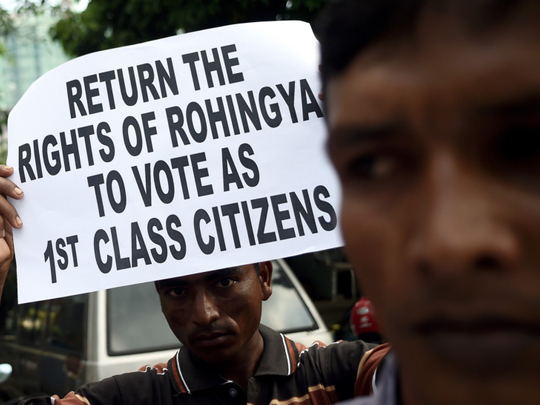
According to the United Nations (UN), the Rohingya Muslims in the Arakan State of Burma are one of the most persecuted minorities in the world.
They are made virtually stateless people in their own country by the policies and laws originated by the Burmese government. Despite having been recognised as an indigenous ethnic community in Burma under the government of U Nu after it got independence from the British Empire in 1948, the 1982 Citizenship Law denies many Rohingya Muslims citizenship and underpins legal discrimination against them. The Rohingyas are widely viewed inside Burma as illegal immigrants from Bangladesh.
There are about 1.3 million Rohingya Muslims, the majority of them live in Myanmar’s Arakan (Rakhine) state, which is bordering Bangladesh and India. However, they continue to struggle to gain access to basic state services. Since 2012, there have been waves of violence against the Rohingya people, leaving hundreds of them killed and injured, and some are even forced to flee their homes and country. About 150,000 Rohingya people are trapped in refugee camps and are forbidden to leave even if they wish to do so.
The Burmese government’s abusive and discriminative policies against the Rohingyas are due to their ethnicity and faith. In 1993, the then Burmese military regime issued temporary Identity Cards (also known as White Cards) exclusively to Rohingya Muslims in Arakan after withdrawing their National Registration Cards. In fact, they were supposed to be replaced with Citizenship Scrutiny Cards. However, they were not simply because the Rohingyas are Muslims and look different from the majority of the Buddhist people.
The Rohingya Muslims have been actively involved in the political activities of the Burmese government since its independence. Today, there are four Rohingya members in the Burmese Union Parliament. However, recently the Burmese regime stripped away the voting rights of the White Card holders – roughly one million Rohingya Muslims as a result of protests by Buddhist nationalists.
Despite the fact that in December 2014, the UN passed a resolution urging the Burmese government to grant the Rohingyas full citizenship rights, the Burmese regime immediately rejected the resolution. In addition, on February 10, the office of the Burmese President issued a statement saying that the White Card holders have two months from the expiry date of their cards, which is on March 31 to surrender them to the authorities, who would then assess their citizenship status under the current country’s citizenship laws.
— Dr Than Aung is a Burmese managing director based in Sharjah








